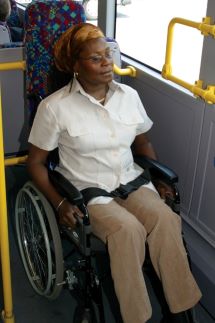Coordinated Public Transit-Human Services Transportation Plan
Background - Why Coordinated Planning?
In Wake County, as in many locales, multiple federal, state and local programs such as the Departments of Agriculture, Education, Health and Human Services, Veterans Affairs, etc. fund or support transportation services for their clients. Many of these “human service transportation” funding programs are entirely separate and distinct from transportation funding and service provided by the U.S. Department of Transportation and Federal Transit Administration (FTA). Due to a variety of differing rules, regulations, and processes, human service and public transportation programs are not always mutually supportive or coordinated. The lack of coordination means some systems and programs are duplicative, overly complex, expensive, and difficult to understand and use. The goal of coordination planning is to untangle the separate systems and encourage them to complement each other and work towards an accessible, easy to use system.
The Raleigh UZA, which includes a large part of Wake County, and part of Johnston County, has been and continues to be a fast growing region. The region has responded to this growth with a variety of transportation investments, including the Wake Transit Plan. A critical goal of the Raleigh UZA / Wake County LCHSPT Plan Update, therefore, was to inventory and evaluate how the planned investments in public transportation will impact local and regional human service transportation. As part of understanding these changes and their impacts on human service transportation needs, the LCHSPT Plan Update focused on identifying strategies to address remaining gaps. In addition, the FTA requires that urbanized areas develop Coordinated Human Service Transportation Plans (CHSTP) to access certain FTA grant programs. Accordingly, a LCHSPT Plan has been prepared to align with the Wake Bus Plan as part of planning and programming bus service changes.
The 2018 Raleigh Urbanized Area (Raleigh UZA) / Wake County Coordinated Public Transit-Human Services Transportation (CPT-HST) Plan (2018 Update & Amendment #1) which was approved by the Executive Board on February 19, 2020 was updated in 2024. The 2024 coordinated plan sets regional priorities for transportation investments and initiatives for human services and public transit coordination. The coordinated plan also guides funding and service development for transportation projects supporting older adults, people with disabilities and individuals with low incomes. The 2018 plan served as a federally required update to the 2013 Coordinated Human Services Transportation Plan. The plan was completed in concert with the Wake Bus Plan, a larger effort designed to guide transit service and capital investments associated with the Wake Transit Plan. The updated 2024 plan includes coordination with the goals and recommendations of the 2018 coordinated plan, the Mobility Coordination Committee's work of the last five (5) years, the newly created, regional Mobility Management Program/recommendations from the 2022 Mobility Management Implementation Study and the work program of CAMPO's new regional Mobility Manager position. The stakeholder/public outreach portion of the 2024 plan update gathers input on gaps and overlaps in services, needs and assesments for transportation services in the region.
Goals of the 2024 Coordinated Public Transit - Human Services Transportation Plan (CPT-HSTP)
- Develp policies and programs to support mobility coordination efforts across the CAMPO and adjacent regions.
- Coordinate ADA Paratransit services throughout the CAMPO region.
- Support transportation services that address mobility needs of the CAMPO region.
- Raise awareness of mobility options throughout the region
Goals of the 2018 Raleigh UZA/Wake County CHSPT Plan
- Create a 5-year strategic plan to meet non-Medicaid human service transportation needs.
- Identify human service transportation needs and service gaps in the context of an expanded regional transit network.
- Identify transportation options and coordination strategies that will meet rural and human service transportation needs.
- Develop strategies and recommendations that are coordinated with, and complementary to, the Wake Transit Plan.
- Meet the federal requirements to access FTA funding programs.
While each goal is important, the ultimate objective of a coordinated plan is to create a seamless system, which maximizes mobility for individuals, eliminates barriers for travelers and achieves operational efficiency.
- 2024 Coordinated Public Transit Human Services Transportation Plan - Adopted September 2024
- 2018 Updated Raleigh UZA/Wake County CPT-HST Plan w/ Amendment #1 - February 2020
- 2018 Updated Raleigh UZA/Wake County CHSPT Plan - original
- 2019-2022 Short-Term Recommendation's Status and Update Report


